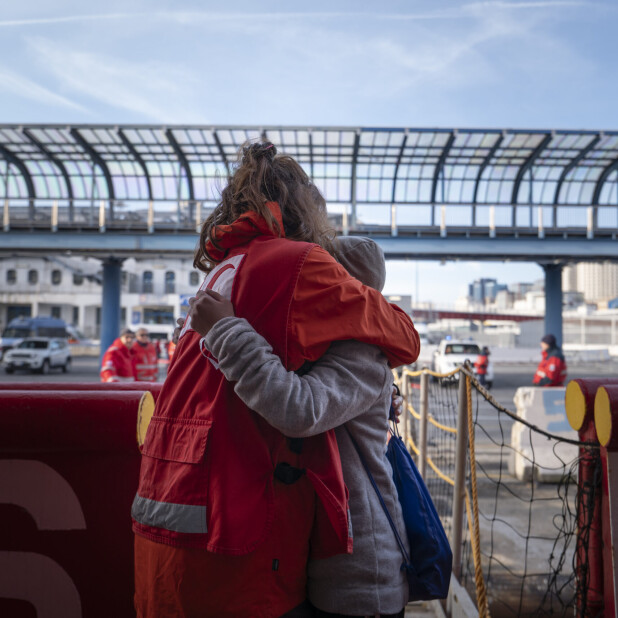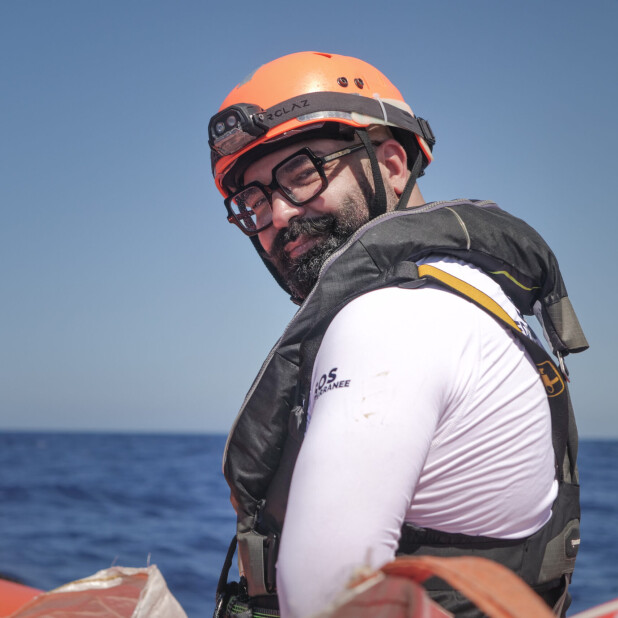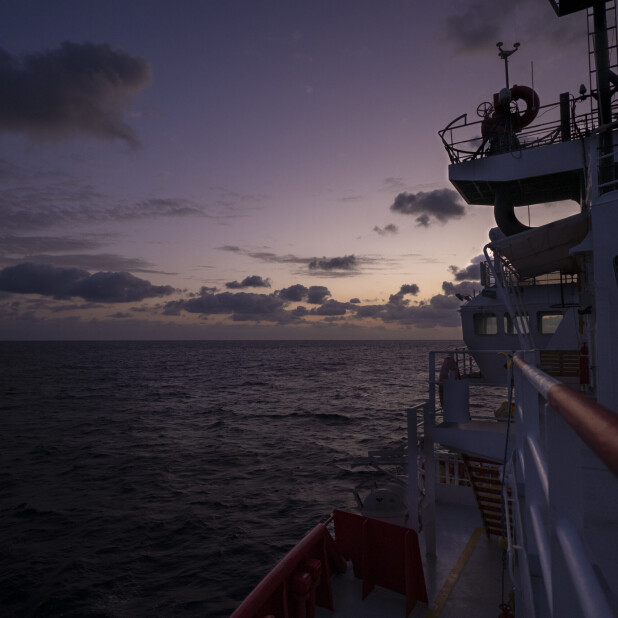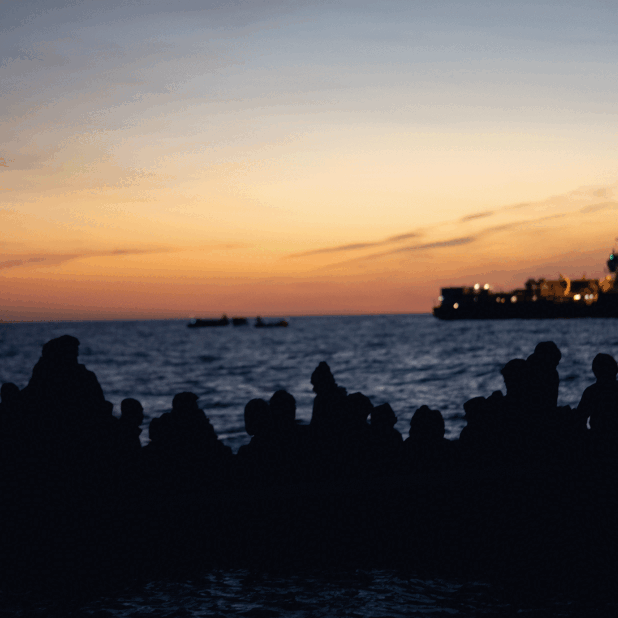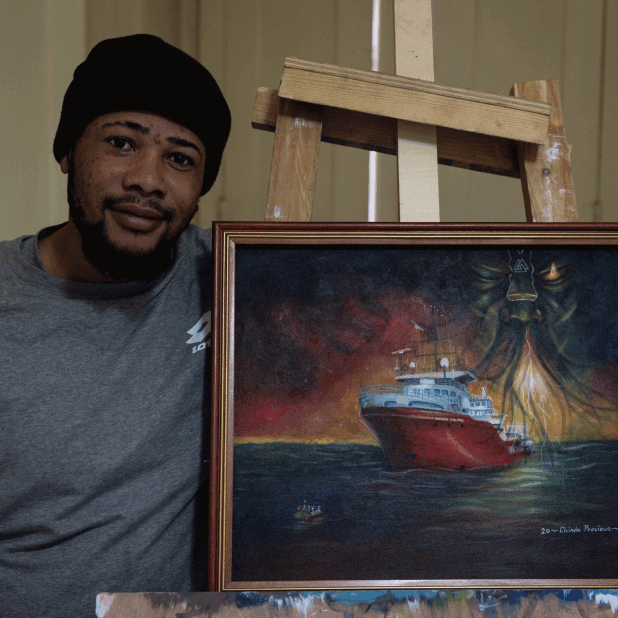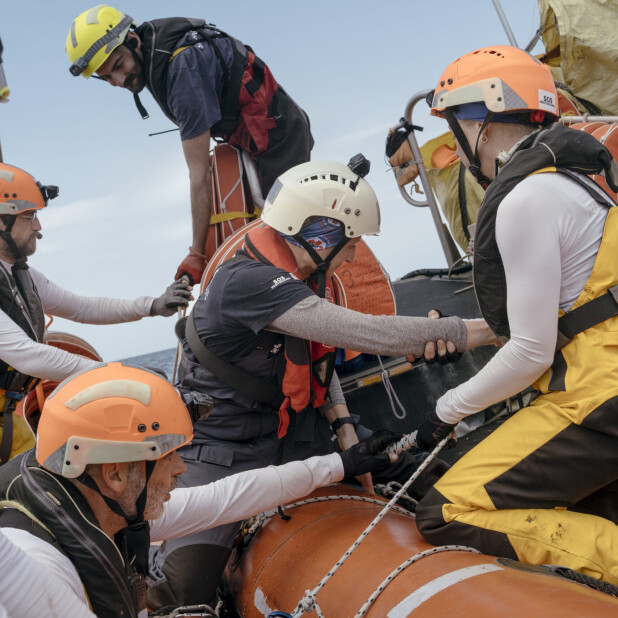
Warning – distressing content: The following article alludes to acts of sexual violence.
Working on a rescue ship in the central Mediterranean means working in emergency response. That should be self-evident, but the crisis in the Mediterranean has been discussed in politics and media for so long now that I sometimes feel like people forget. What we do on the Ocean Viking when we go from having an empty ship to caring for almost 400 people with a 31-person crew within less than 48 hours is quintessential emergency response.
As a Communications Officer, I want to share positive stories, highlight how brave and multifaceted the people we rescue are. Especially the women. So, when speaking about the women we had on board this January, I want to talk about “Bijou”, who wants to put her whole journey into song and make a video about every part of it. Or about “Ange”, the Cameroonian seamstress who designs festive clothing for marriages and celebrations. I want to talk about the strength of “the sorceress”, who brought to safety her one month old baby girl.
But that’s only part of the story. The truth is painful. It is not romantic. It is not fair. It is infuriating and sickening. Working in an emergency response setting means that a lot of the time, the truth comes out in the midst of chaos, during ongoing rescue operations, while we are trying to ensure the safety and wellbeing of hundreds of survivors at the same time.
For the female team members on the Ocean Viking during the January mission, the overwhelming feeling was that behind each question to a female survivor lies an abyss. Hannah, the midwife on board, has been specialized in working with survivors of sexual violence for four years. She has worked in crises and conflicts in different parts of the world. “In South Sudan, rape is used as a weapon of war”, she explains. “But I have never worked in a context where sexual violence is as widespread, as systematic and brutal as what happens to these women in Libya.”
What happened to the women we rescue when they were in Libya, that’s the abyss. It can be the simplest questions that open up the abyss, and then there we are, standing at the edge, together with the survivors, looking down.
The first time the abyss opens up before me on the Ocean Viking in January is at night time, in the midst of a challenging rescue operation. All the women are already safely on board but the men are still being evacuated from the rubber boat in distress. I translate for Hannah, the midwife, a question that would seem simple to most people: “Do you know if you’re pregnant?” The story comes flowing out of the young woman like through a crack in a dam. “I was raped. There were two of them. They were armed.” The abyss. We hardly have a moment to talk, survivors keep arriving on the Ocean Viking. We have to take care of her later.
That same night, in the entry to the onboard clinic, women are waiting in line. One of them complains about pain in her abdomen. She says she needs medication, I am translating for Caterina, the Doctor, but I don’t understand which pill she needs, so I have to ask what she needs it for. Two or three days prior, she was beaten so badly after being intercepted and brought back to Libya that she suffered a miscarriage, she tells me. She waited a full day at the hospital in Tripoli before she was treated. She needs an antibiotic because of the risk of infection. The abyss opens up again. Abdomen pain, beating, miscarriage. As I would find out later, the pregnancy resulted from rape. The woman and her fiancé had decided to keep the baby, but now it’s gone.
The next woman in the clinic complains of general body pain, dizziness and fatigue. She ends up disclosing an incident to Caterina and me that she had never told anyone about. Not even her sister. She is too ashamed. She cries and cries out of shame. She says she has isolated herself ever since it happened. Out of shame. Caterina and I just hold her. We tell her it’s not her fault. That she is not the one who should be ashamed, but the men who did that to her.
Caterina and I meet in the entry to the clinic between consultations. A brief moment of silence, a break of maybe 30 seconds. “The worst is when they say thank you,” Caterina finally says. “We do the bare minimum for them and they thank us. This should not even be necessary. What was done to them is inhumane. But I cannot be inhumane. They should not thank us for treating them like humans. They are so strong. I don’t know how I would survive.” Then we have to continue. This is still an emergency.
Another survivor. Another consultation. “Any major surgery in the past?”, we ask. “A C-section, some years ago.” We pause. She is on board alone. “Where is the child?”, we ask. Separated from the mother when they were getting on the boat to flee Libya. The little boy got scared of the armed men, “he just slipped away from between my legs,” she says. When she wanted to run after him, she was forced to board the boat at gunpoint. She hopes that he will be united with one of her sisters who is also still Libya. The abyss. Pain on top of pain.
The next day, I hear the story of a woman who was raped in the desert, crossing the border into Libya during the night. She was on foot, with a group of people and a guide. The army, border police, or a militia saw them, but let them pass. Everyone except her. She had to stay behind. The men, the guns, the shame. When they let her go, she was so weak she could barely walk. Her dress, gone. The wig she was wearing, gone. The baby she was pregnant with when she left her home country, gone.
The night before the disembarkation, the women and children on board are the last ones still awake. In the women’s Shelter, the safe space for female survivors and young children on the Ocean Viking, they are sitting in a big circle, singing songs of praise, a sort of gospel. One woman is drumming. Many of the songs are “call and response”, where the women take turns singing an individual line, and the group responds in choir. In the first song, the response is “c’est cadeau” (that’s a gift). It’s joyous, a song of gratitude and humility. In the next song, the women sing about “là-bas” (over there). A song of hope, about a better future, the plenty that awaits either where the women are going, or in the afterlife.
A new song begins, this time the response is “c’est fini-oh” (it’s over, oh). Again, the women take turns listing all that is finally over. But the mood changes. Now they are singing about Libya. “L’esclavage” (slavery), one woman sings, “c’est fini-oh”, the others respond. “La prison, c’est fini-oh” (prison is over). “Le viol, c’est fini-oh” (rape is over). The woman who was drumming before is now standing in the middle of the room, she goes from singing to speaking. She is speaking directly to me, sitting in the door with two little girls on my lap, and to Hippolyte, the cartoonist on board with us, who is standing behind me. “In Libya, they rape us mentally, they rape our bodies, they rape our children, rape is everywhere”. There it is again: The abyss. I look around me. All these women, all these babies.
As I am about to close the door to the Shelter for the night, one woman steps out with me to refill her water bottle. She complains about a headache, I tell her I can get some paracetamol for her. “I’m not sure it helps,” she says. “I’ve had this headache since prison.” And then the abyss opens up before me again, deeper than before.
I can’t bring myself to write down exactly what this woman told me. I am afraid people won’t believe it. We could not put enough trigger warnings on it. What she lived through in prison is indescribable. I will just say this: she only escaped when the guards thought she was dead and threw her naked body into a container on the street. She finishes her story saying: “I told myself, if the Libyan coastguard comes, I will throw myself into the water. I have lived through hell on earth in prison. I have lived through worse than hell. I have cigarette burns everywhere. I carry the evidence all over my body.”
I will carry her story in me forever, but I do not carry her memory. I don’t know how she does it. I can only hope she will receive the care she deserves. That night, standing by the water filler with her, I try to remember what I learned about Psychological First Aid. I tell her how strong she is, that she is not to blame, that Libya is over. It all feels futile. But neither of us is crying. For her, it is time to sleep. For me, it is time for my watch on deck, we have to make sure everyone is safe during the night. This is still an emergency.
For many of these women, there won’t be a happy end. Europe won’t be the “là-bas” of their song, the land of plenty. As I watch them disembark, I feel mostly anger. I’m angry that this could happen to them today, in the 21st century. Angry that all of this is widely known, and that Europe still finances the Libyan coastguard, who routinely break international law by returning people to Libya, which is an inhumane prison for them. Especially for these women. Angry that all I can do is to write it down, even though it has all been said before, in the hope that someone will follow me to the edge of the abyss and look down with me. Really look down at the reality of it, the horror, the injustice, so that we start to do more, collectively, to protect our fellow human beings.
***
Text: Julia, Communication Officer for SOS MEDITERRANEE
Photo credits: Hippolyte

